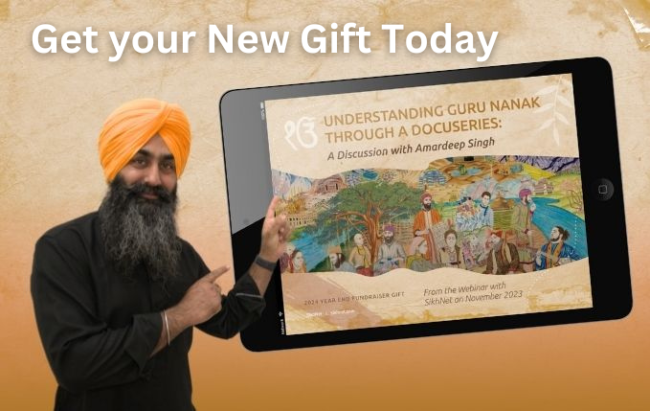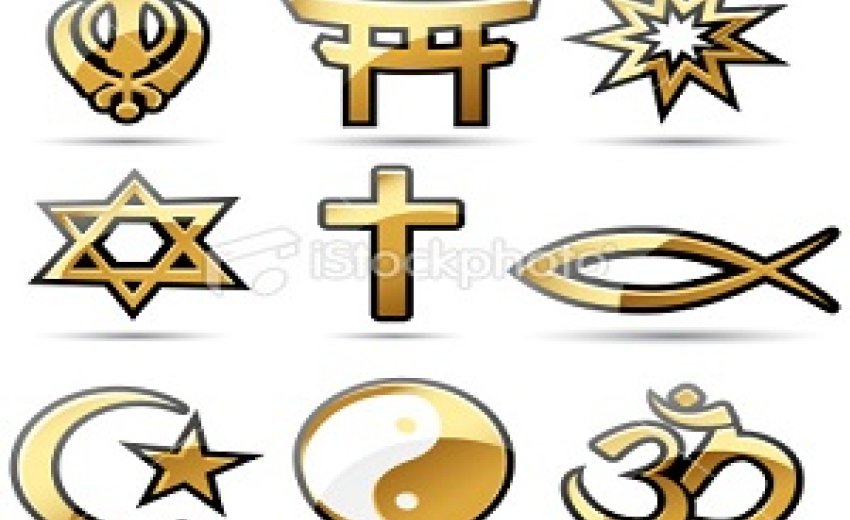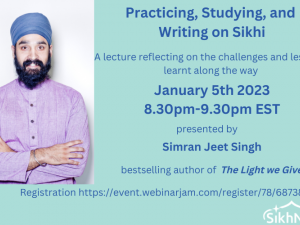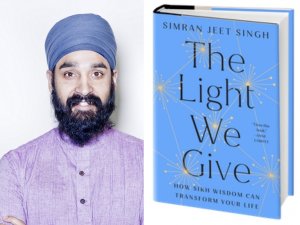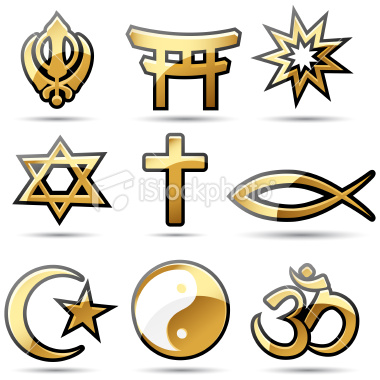 08/07/2012: In the aftermath of the tragic shooting at the Sikh Temple of Wisconsin, Omid Safi, Professor of Religious Studies at University of North Carolina at Chapel Hill and one of America's Muslim public intellectuals interviewed Simran Jeet Singh, a doctoral candiate in the Department of Religion at Columbia University whose work focuses on the life and memory of Guru Nanak.
08/07/2012: In the aftermath of the tragic shooting at the Sikh Temple of Wisconsin, Omid Safi, Professor of Religious Studies at University of North Carolina at Chapel Hill and one of America's Muslim public intellectuals interviewed Simran Jeet Singh, a doctoral candiate in the Department of Religion at Columbia University whose work focuses on the life and memory of Guru Nanak.
The focus on this interview is increased understanding and appreciation for the Sikh religion.
Many people are not particularly informed about the Sikh faith. What are the main teachings of Sikhism?
The Sikh tradition (Sikhi) encourages individuals to develop their own relationship with the Divine while also helping others grow spiritually. It places equal importance on social action and spiritual development.
The most basic teachings of Sikhi focus on oneness and love. Sikhs believe in a singular divine force that permeates the entire world and all people, and therefore, Sikhs strive to ensure equality and justice in all levels of society. The theology of love and oneness leads to an emphasis on action; Sikhism seeks to eliminate suffering in the world, and all service is considered to be a divinely inspired expression of worship.
Even CNN seems to have a hard time getting the basic facts about Sikhism right. There has been a lot of "Sikhs are not Muslims. They are Hindus" kinds of statements. Can you help us get a basic sense of the history of the Sikh faith, and its relationship to the Islamic and Hindu traditions?
The Sikh religion is an independent religion that developed in South Asia about 500 years ago. It emerged in a society dominated by Hinduism and Islam, and therefore, people assume that it is either an off-shoot or synthesis of Islam and Hinduism. However, Sikhi is a religion with its own founder (Guru Nanak) who preached a message of spiritual and social living. Sikhs revere a distinct scripture (The Guru Granth Sahib), maintain their own centers for worship and learning (gurdwara), practice distinctive disciplines and conduct unique ceremonies. Scholars, historians and Sikhs themselves consider Sikhi to be an independent religion.
How many American Sikhs are there?
Although Sikhs have been in the United States for over a century, the U.S. Census has not yet counted Sikhs as a unique community. Therefore we do not have precise numbers. Most estimates place the number of Sikhs in the world at around 25 million, which makes it the fifth largest world religion. There are approximately 1 million Sikhs in North America -- about 500,000 in the U.S. and 500,000 in Canada.
What's the mood in the Sikh community like after the shootings?
Everyone I have spoken to in the Sikh community has been saddened. The suffering incurred by the victims is unimaginable, and people generally that this a nightmare turning into a reality. Despite the shock, however, I do not consider this tragedy to be entirely surprising. Sikhs have been targeted by hate crimes consistently in post-9/11 America, and I have felt so moved by the community's suffering that I have been writing about it extensively over the past couple of months.
In light of all this, I have been inspired by the community's response to the violence. There is a general feeling that responding with hatred or vengeance will not solve anything, and Sikh organizations are leading the charge to bring the community together, support one another, and provide a unified message of love and compassion.
We are hearing reports that the shooter might have had a 9/11 tattoo, and there is the strong possibility that prejudice against Sikhs is often deeply intertwined with prejudice against Muslims. How do suggest we think about that?
While it is too early to know the killer's intentions, I cannot help but feel that this is a hate crime. Sikhs have been targeted in acts of anti-Muslim violence consistently since 9/11, largely because the Sikh identity closely resembles the images of terrorism we see in western media. Based on what they see in the news, people see me and immediately think of bin Laden, the Taliban and al Qaeda.
In fact, I helped teach a course on Islam this past semester at Columbia, and on the very first day, I asked my class to tell me what assumptions they had when they first walked in and saw me (of course, I promised their responses would not affect their grades). Although I expected some of the stereotypes I received, I was shocked by the basic lack of knowledge about Sikhi and Islam, as well as the undertones of anti-Muslim sentiments that they expressed. These are undergraduates at Columbia University, some of the best-educated people in the country!
The conflation of Sikh and Muslim identities is especially troubling in the modern context of Islamophobia and Sikhophobia. From my perspective, it seems like a hate-crime against a particular religious community -- why else would Wade Page attack a religious center? It is important that we think about this as an act of violence targeting the Sikh community, but we should keep in mind that violence against Sikh-Americans is often inspired by hatred for Muslims. I find the anti-Muslim and anti-Sikh vitriol in this country to be complex, unacceptable and deeply disturbing.
In the original moments after the shooting, some members of the Sikh community -- admittedly in a moment of grief -- said "we are a peaceful people. We are not Muslims." What do you think is a compassionate response to those kinds of statements?
I appreciate the importance of pointing out that Sikhs are a peace-loving people and represent an independent religion. However, it is important that we go one step further. We have to point out that all violence against innocent people must be condemned, no matter the community it targets.
By simply distinguishing ourselves from Muslims, we are essentially saying: "It's not us, it's them." We need to come together with our Muslim brothers and sisters and project a unified voice of compassion and love.
What would you like to see from the Muslim community at this point?
I would love to see the Muslim community reach out to Sikhs and support them in this tragedy. Acts like these will go a long way in building future relationships and coalitions. Muslims Americans have done a wonderful job over the past decade establishing themselves as important members of American society. I would like for Muslims to empathize with the current situation of American Sikhs and offer their support with the healing process.
What would you like to see people do to help?
The best thing people can do to help is to respond with love and compassion. Fanning the flames of hate will only make things worse. People could also use this opportunity to educate themselves and others about Sikhi, Islam and any other communities about which they know little. Knowledge is a powerful thing, especially when we use it to break down divisions we have created amongst ourselves.
Finally, I think it would be a great gesture if people could support the victims and their families. A fund has been started to support the Milwaukee community (including the Sikhs and police officers), and these funds are being used to "defray the costs of medical bills, funeral expenses, and psychological counseling." http://www.indiegogo.com/Milwaukee-Sikh
